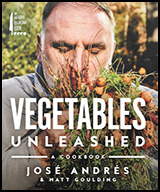 Ultimate Veg
Ultimate Veg Jamie Oliver, 2019
Most of these recipes produce dishes that are edible but are just the sum of their parts. They also tend to be rooted in the British culinary tradition, which is not the most promising soil. One thing that amused me was that pretty much every recipe concludes with an instruction to “season to perfection”, with the exception of one, which demanded that the cook “season to absolute perfection”. I guess that for the others relative perfection will suffice.
 Vegetables Unleashed
Vegetables Unleashed José Andrés and Matt Goulding, 2019
See above; these recipes are hit or miss, probably more miss than hit, and even the hits generally just taste like their ingredients put together, with none of the alchemy that makes a recipe into a keeper. After trying one recipe I noted that it was fine, but that you don’t have to listen to a famous chef to learn that boiling a vegetable and adding some salt will probably make for an acceptable meal; the surprise is how many of these manage to mess that up and come out as duds.
 Chez Panisse Vegetables
Chez Panisse Vegetables Alice Waters, 1996
So I guess this ends up as the winner from this batch just by default, though it’s not even a real cookbook. It does include a handful of recipes, and some are great: the butternut squash risotto turned out to be one of the best risottos I’ve ever made. But this is not about showstopping main dishes, but rather the sort of things Chez Panisse slips in as a minor course in a prix fixé menu. So a lot of the “recipes” are handwavey (“Roast at 350° for an hour, puree, add salt and pepper, and throw in some butter and cream if you like”) or just suggestions like “Hey, if you’ve got some peas on hand, they go well with spring onions and lettuce”. Skippable.
While I’m wrapping up 2023, here are a couple of TV shows I watched the pilots of this year and then elected not to watch any more episodes.
Schitt’s CreekDan Levy and Eugene Levy, 2015
recommended by Kate Rosen
I feel like I’ve said this a million times before, but it doesn’t look like I’ve formally written it up as a pattern, so I guess it’s about time I did that. Here you go:
45 | One of my least favorite types of comedy is “Ha ha, aren’t these people awful?” Comedy tends to be based on the unexpected: we anticipate one thing, we get something different, our brains react with a kind of short circuit, and we laugh. But if the expected is “tolerable behavior” and we instead get “intolerable behavior”, for me any laughter the incongruity may produce is outweighed by the fact that I’m being subjected to intolerable behavior. Even when the humor is supposed to derive from awful people getting their comeuppance for being awful, that is meager compensation for having to spend time around awful people. |
I have gathered that the people get less awful in later seasons and that ultimately the show is a kind of redemption narrative, but (a) I’m not a fan of redemption narratives (just be good in the first place!) and (b) I find it kind of preposterous to hear people say, in effect, “Yeah, the show starts slow, but all in all it’s 1804 minutes and by minute 900 it’s really hitting its stride!”
Phoebe Waller-Bridge, 2016
recommended by Katie, Will Treece, and Barack Obama
Violates Patterns 23 and 45—the Michael Jordan special. I think the key moment in the pilot sums it up: the main character declares, “I am a greedy, perverted, selfish, apathetic, cynical, depraved, morally bankrupt woman who can’t even call herself a feminist!” Hey, you said it, not me. And that being said, I have zero interest in spending one moment longer watching your exploits.
Sofia Samatar, 2013
the sixty-second book in the visitor recommendation series;
suggested by Wesley Osam
This one is an exercise in meticulous world-building. Sentences are full of proper nouns with fictitious referents; I just flipped to a random page and my eye fell upon this one: “In their speech ran the reed sounds of Evmeni and the salty oaths of Kalka; they used the Kideti words for certain fruits and coastal winds, and their slang throbbed with the sibilant hum of the tongue of the Kestenyi highlands.” And chance seems to have smiled upon me, because that seems to be about sailors, and I think a sailing metaphor is appropriate here. I am not remotely nautical, but as I understand it, in days of old you had to row to get a ship moving on calm seas, but could then hoist sail when the wind picked up and thereby move with a lot less effort. A book requires that you buy in long enough for the plot to get underway: you row for a while, putting in the effort to turn those first few pages, until enough narrative momentum builds that it’s no longer an effort—you’re eager to see what comes next. I read the first several chapters of A Stranger in Olondria waiting for the plot to get underway, until I realized that the plot was already well underway and I was still rowing. This is also a book full of paeans to how wondrous and magical books are, making it the worst kind of violator of Pattern 43. That was enough to make me wish that the hours I had left to go reading this book could be spent on a different one, and I decided to make my wish come true.
 |
 |
 |
 |
||
|---|---|---|---|---|---|
Tumblr |
this site |
Calendar page |
|||